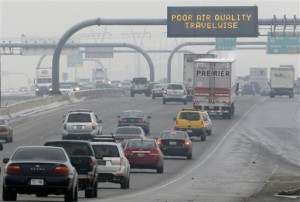
Forty-eight percent of Wasatch Front air pollution comes from vehicles, according to the Utah Department of Environmental Quality. In response, Rep. Patrice Arent, D-Millcreek, filed HB101, a bill that would require emissions testing on diesel vehicles in Utah.
“This is not my background. I’m not a scientist,” said Arent, who is also the founder of the Clean Air Caucus. “But the more I heard from my constituents and the more I learned myself, I realized that we needed to take this on in a serious way.”
Of the five counties in Utah the federal government has declared as non-attainment areas, Utah County is the only one not currently requiring emissions testing for diesel vehicles. Salt Lake, Davis, Weber and Cache counties do so voluntarily.
According to the Environmental Protection Agency’s website, a non-attainment area is “a geographic area that does not meet one or more of the federal air quality standards.”
Scott Williams, executive director of HEAL Utah, said diesel emissions, while not a huge portion of emissions, still make a significant contribution to the problem.
“It’s not fair that the drivers in Utah County aren’t having to assure that their vehicles are as clean as possible,” Williams said.
The Utah Division of Air Quality predicts the bill would eliminate 170 tons of pollution each year in Utah County alone.
For vehicle owners, the cost would be $25 per inspection, similar to the cost of emissions testing for gasoline vehicles. Tests would be required yearly for older models and every other year for models made in the last six years.
The bill would not apply to agricultural and construction vehicles.

An identical bill was proposed last year, but the Legislature did not pass it in time before the session ended. If passed this year, HB101 would take effect on Jan. 1, 2019.
Speaking of the issue of air quality, Arent said, “It’s very important in terms of health and it’s very important in terms of economic development. And when you see the polling, it’s important to the citizens of Utah.”
HB101 is not the only legislation proposed for the 2018 general session that addresses environmental concerns.
Rep. Raymond Ward, R-Bountiful, has filed HCR1, a house resolution acknowledging climate change and the role of human emissions in global warming.
“If it’s true that emissions are causing warming, and that therefore additional large amounts of emissions will cause more warming, that has implications for every single human being on the planet,” Ward said.
The last time the Utah Legislature addressed climate change in a resolution was in 2010, when they called for the Environmental Protection Agency to end its carbon dioxide reduction regulations “until climate data and global warming science are substantiated.”
“Given that that was our last statement, to me that means it’s time to think about it again,” Ward said.




